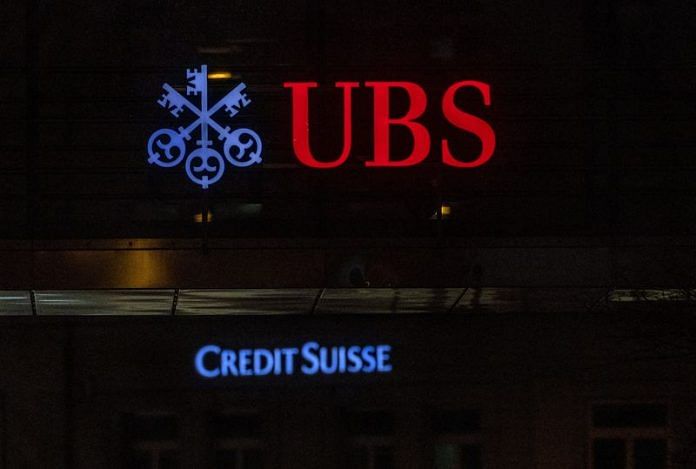Zurich: Banking stocks tumbled on Monday as initial relief over a historic state-backed rescue of troubled lender Credit Suisse by Swiss rival UBS Group gave way to new worries about the risks of high-yield debt issued by big banks.
In a package orchestrated by Swiss regulators on Sunday, UBS Group AG will pay 3 billion Swiss francs ($3.23 billion) for 167-year-old Credit Suisse Group AG and assume up to $5.4 billion in losses.
Major central banks, faced with the risk of a fast-moving loss of confidence in the financial system, also scrambled on Sunday to bolster the flow of cash around the world with a series of coordinated currency swaps to ensure banks have the dollars needed to operate.
While those developments appeared to shore up investor confidence in early Asian trade, the rally quickly evaporated as focus shifted to the massive hit some Credit Suisse bondholders would take under the UBS acquisition.
Under the deal, the Swiss regulator decided that Credit Suisse additional tier-1 bonds – or AT1 bonds – with a notional value of $17 billion will be valued at zero, angering some of the holders of the debt who thought they would be better protected than shareholders in the takeover deal announced on Sunday.
Worries about what that might mean for holders of AT1 bonds issued by other banks added to persistent anxiety about a range of other risks including contagion, the fragile state of U.S. regional banks and moral hazard.
Standard Chartered Plc and HSBC shares each fell more than 6 per cent in Hong Kong on Monday to more than two-month lows, with HSBC facing the possibility of posting its largest one-day drop in six months. The MSCI index for financial stocks in Asia ex-Japan was down 1.3 per cent.
“It should be clear that after more than a week into the banking panic, and two interventions organised by the authorities, this problem is not going away. Quite the contrary, it has gone global,” said Mike O’Rourke, chief market strategist, Jones Trading.
“The reports that UBS is acquiring Credit Suisse will likely magnify Credit Suisse’s problems by moving them to UBS.”
Co-ordinated action
The shotgun Swiss banking marriage is backed by a massive government guarantee, helping prevent what would have been one of the largest banking collapses since the fall of Lehman Brothers in 2008.
Pressure on UBS helped seal Sunday’s deal.
“It’s a historic day in Switzerland, and a day frankly, we hoped, would not come,” UBS Chairman Colm Kelleher told analysts on a conference call. “I would like to make it clear that while we did not initiate discussions, we believe that this transaction is financially attractive for UBS shareholders,” Kelleher said.
UBS CEO Ralph Hamers said there were still many details to be worked through.
“I know that there must be still questions that we have not been able to answer,” he said. “And I understand that and I even want to apologise for it.”
In a global response not seen since the height of the pandemic, the Fed said it had joined central banks in Canada, England, Japan, the EU and Switzerland in a co-ordinated action to enhance market liquidity. The European Central Bank vowed to support euro zone banks with loans if needed, adding the Swiss rescue of Credit Suisse was “instrumental” in restoring calm.
On Monday, Credit Suisse’s banking operations appeared to be business as usual at its major offices in Asia.
Monetary authorities in Singapore and Hong Kong, where Credit Suisse hosts large regional offices, separately said the Swiss bank’s business continued without interruption.
And Credit Suisse urged its staff to go to work, according to a memo to staff seen by Reuters.
Unresolved issues
Problems remain in the U.S. banking sector, where bank stocks remained under pressure despite a move by several large banks to deposit $30 billion into First Republic Bank, an institution rocked by the failures of Silicon Valley and Signature Bank.
On Sunday, First Republic saw its credit ratings downgraded deeper into junk status by S&P Global, which said the deposit infusion may not solve its liquidity problems.
There are also concerns about what happens next at Credit Suisse and what that means for investors, clients and employees.
In the memo to employees, Credit Suisse said that once the takeover is complete wealth management clients may want to consider moving some assets to another bank if concentration was a concern.
The deal will also make UBS Switzerland’s only global bank and the Swiss economy more dependent on a single lender.
“The Credit Suisse debacle will have serious ramifications for other Swiss financial institutions. A country-wide reputation with prudent financial management, sound regulatory oversight, and, frankly, for being somewhat dour and boring regarding investments, has been wiped away,” said Octavio Marenzi, CEO of Opimas, in Vienna.
UBS chairman Kelleher told a media conference that it will wind down Credit Suisse’s investment bank, which has thousands of employees worldwide. UBS said it expected annual cost savings of some $7 billion by 2027.
The Swiss central bank said Sunday’s deal includes 100 billion Swiss francs ($108 billion) in liquidity assistance for UBS and Credit Suisse.
Credit Suisse shares lost a quarter of their value last week. The bank was forced to tap $54 billion in central bank funding as it tried to recover from scandals that undermined confidence.
($1 = 0.9280 Swiss francs)
(Reporting by Stefania Spezzati, Oliver Hirt and John O’Donnell in Zurich; Additional reporting by Lananh Nguyen, Saeed Azhar and Hannah Langby and Reuters bureaus; Writing by Nick Zieminski and Sam Holmes; Editing by Lisa Shumaker and Muralikumar Anantharaman)
Disclaimer: This report is auto generated from the Reuters news service. ThePrint holds no responsibility for its content.
Also read: Safe-haven yen regains footing as caution builds over bank contagion



